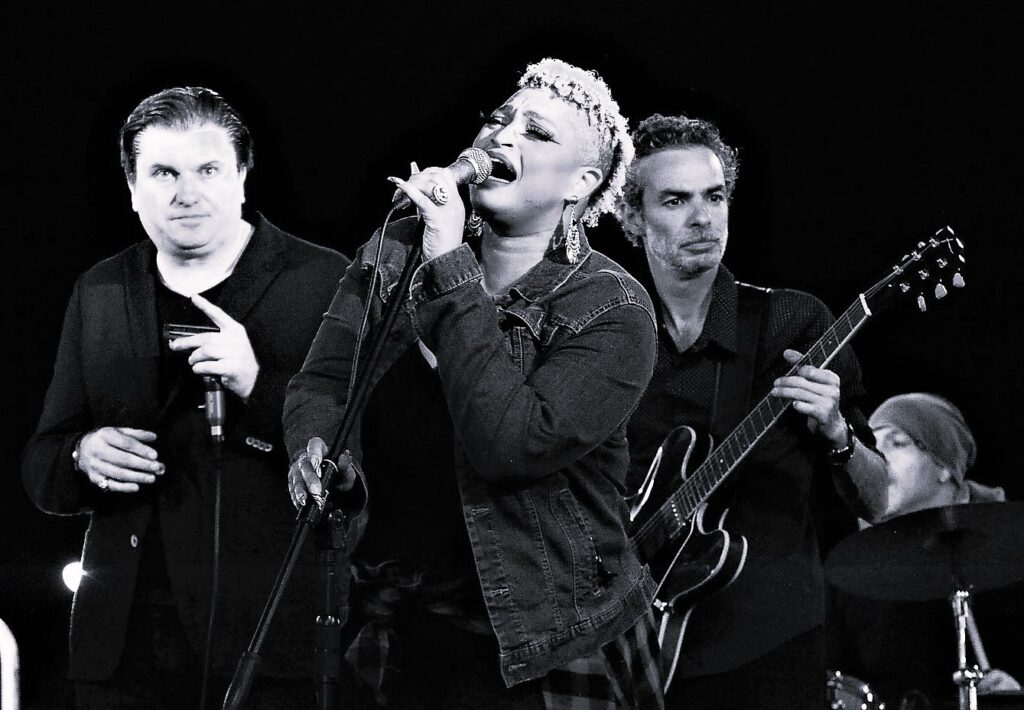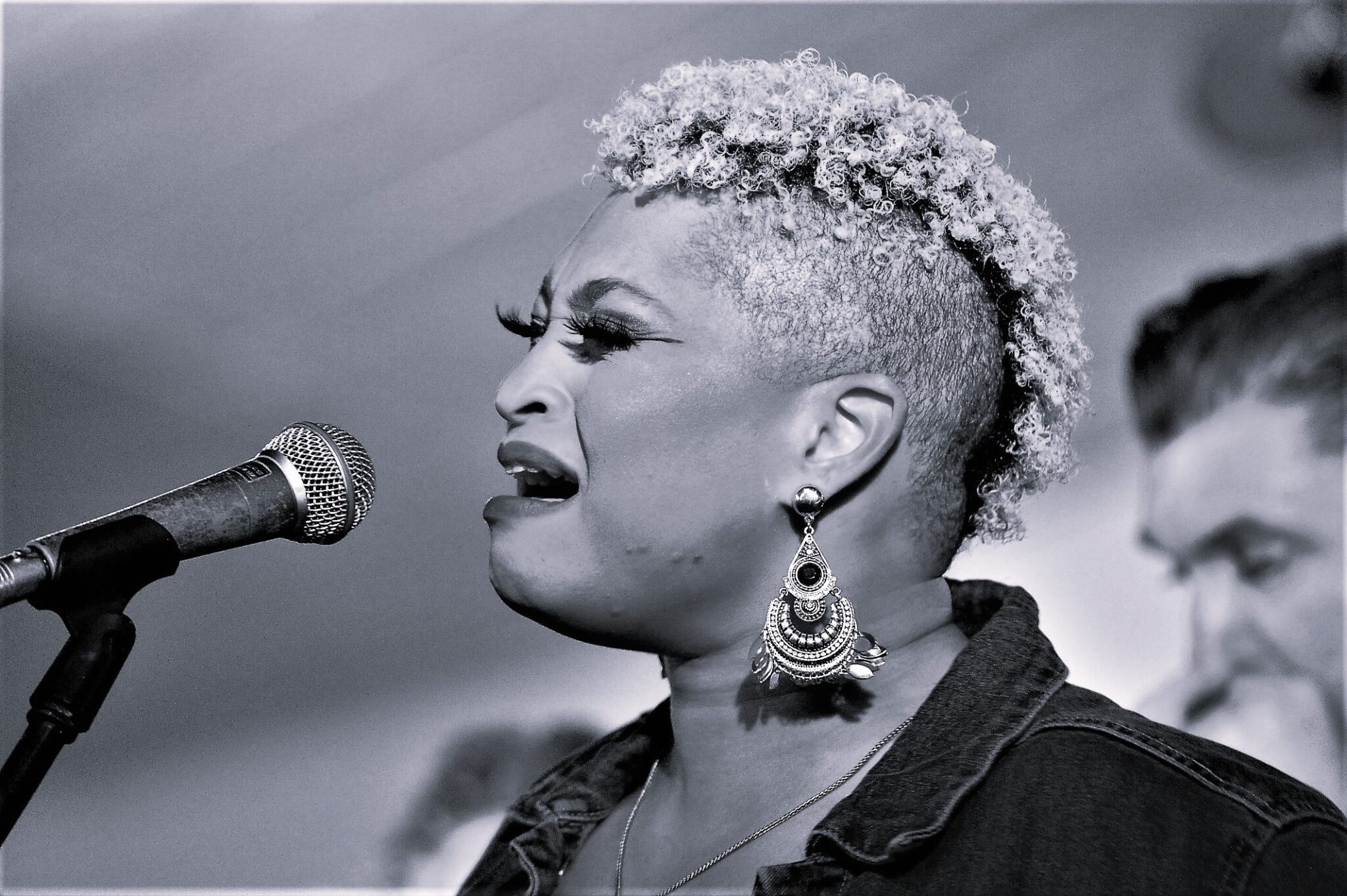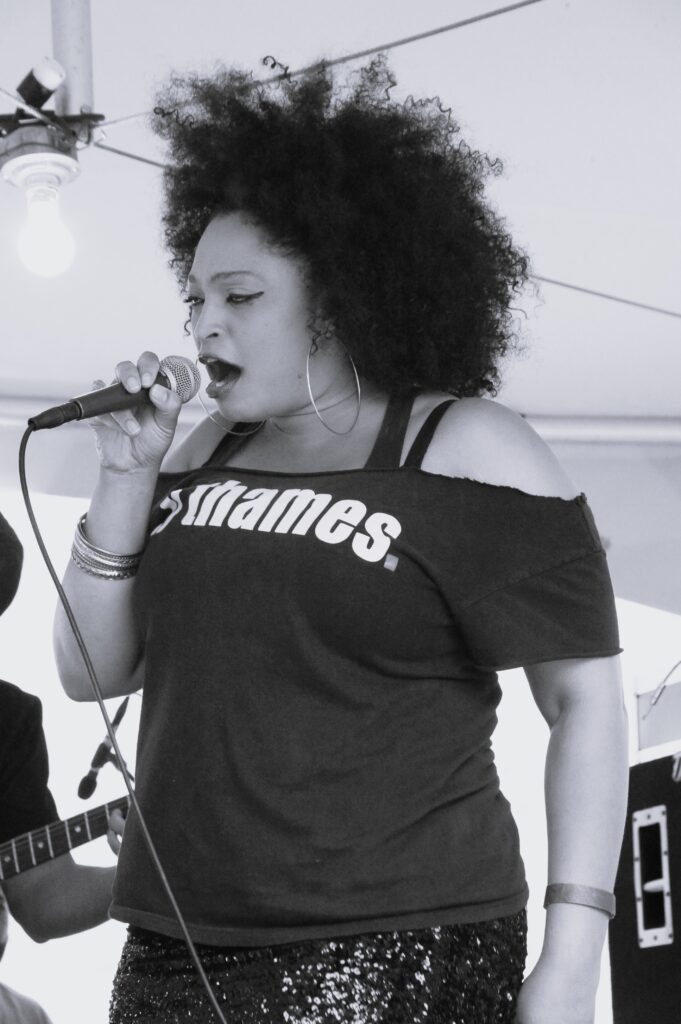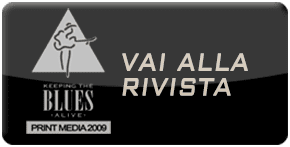“Yes I did retire three years ago, but with the pandemic nobody was touring so everybody went OK, whatever…” JJ Thames laughs about it when we say we’re glad she came back from retirement, as we meet right before the soundcheck for her night gig in Milan with the always solid and dynamic backing of the Luca Giordano Band. Her career has taken JJ from her native Michigan around the US, eventually embracing blues and soul as the foundation for her music. She’s back and determined to leave her mark, “the next album coming out next year, it’s really gonna be me”, she says.
Your journey in music has been somehow non linear but maybe all the more interesting for that. You grew up around Detroit, Michigan and music has always been a big part of your life.
Yes, I did not start the way most people would assume I did. I am a preacher’s daughter but I did not sing in church, I started singing classical actually, I started training when I was nine. I switched over to jazz training when I was fifteen and I continued to train until I was about twenty. By that point I was singing more R&B and soul and writing for other artists, moved to Atlanta, Georgia. I touched the industry in a lot of different ways but I started with a classical viewpoint which I honestly think was beneficial for me as far as being able to switch over into blues and back. I love so many different genres of music, they kind of smashed together on stage…sometimes people are a little surprised at what they might get, from psychedelic rock to jazz and traditional blues or reggae…but blues is elemental music, at the core of it all. I can just go anywhere with it.
So your dad was a preacher?
My father, beside being a preacher, was an executive at General Motors, he started out as a security guard. We’re very proud of him. He retired in 2003 and in 2000 we moved to Jackson, Mississippi, he travelled back and forth until retirement. I was moving around, I lived in New Orleans, Atlanta and Mississippi…but then he went full time into ministry and opened a church in Mississippi, until recently when it closed and he and my mom moved to Las Vegas with me. They’re enjoying it there. It’s a family affair kind of thing.
 Both of your solo records on DeChamp start with a gospel song. So even if you didn’t sing in church as a kid, that music is still part of you.
Both of your solo records on DeChamp start with a gospel song. So even if you didn’t sing in church as a kid, that music is still part of you.
I’m actually an ordained minister myself, I oversee a ministry as well when I’m not touring. It’s a Christian disciple ministry, a community. It’s a large part of my identity, of who I am. That’s funny, on my mom’s side, my grandparents were preachers, my great grandparents where preachers…but on my dad’s side my grandmother ran a juke joint in Emporia, Virginia during the Forties and Fifties. It was the time of the Jim Crow laws, she was in the Green Book…all of the artists that would come through there they would stay at their boarding house and they normally would perform in exchange for boarding and food and all the other stuff, like all the moonshine. So on one hand I came from a very long line of preachers and on the other from a long line of artists and musicians. One of my uncles played guitar, a lot of singers…
It happens quite often saints and sinners, the Saturday night and Sunday morning…
Yes and that’s my makeup from both sides. My father grew up in that environment, I have talked about it with him just recently. Everybody was at his house on Thursday, Friday and Saturday night and his mother would pick the food and cook the food…Music is at the core of my being it is just natural, it is literally in my blood. When people ask me where do you find inspiration, I just go I don’t know, I just wake up! I feel the music.
Can you tell me a bit about the days you moved to Jackson, Mississippi and how you manage to fit with the blues scene there.
When I moved to Jackson I was very naive, but I think it worked in my favor. I didn’t know anything except for a deal I had signed with Warner Brothers but it was pop/R&B type thing. I did the classical and jazz training and a spoken word club in Detroit which was very popular. When I moved to Mississippi I knew that I wanted to be in music, but I had no clue, I did not know anyone…I was eighteen years old so I started to go to the shopping mall and ended up meeting a gentleman. He and I went on a date on Valentine’s day and he took me to a night club, Hamp’s Place, he was trying to impress me. We walked in and I sat there and I listened to this band called Mo Money, they had been playing there for 25 years…I never heard anything like that before, a sound so soulful. It was just the way they interwove…I was in awe. I wanted to be a part of that, even though I was not old enough to be in that club! So I walked up to them and coming from the jazz world I asked if I could sit in with them. In jazz it was a normal thing, I didn’t realise that in the blues world it’s not as normal. You don’t go ask. But I was naive. They looked at me and saw I was a young girl and they said Ok. I think my look might have helped me that day! The funny part is they asked me what I wanted to sing and I said I could do a jazz standard like “Misty” or “Summertime” or “Autumn Leaves” but they say, “no, songs like that are not gonna work here.” I knew nothing about blues! The extent I knew about blues was some Billie Holiday, like “Strange Fruit” and some Nina Simone, but that was as far as I went. So they were like, “Ok how about you come back to rehearsals on Tuesday and we’ll work out something”. I knew nothing. I was not exposed to blues at all.
So your mom and dad would not listen to that at home?
No, my dad grew up on it, but I grew up on Carmen…seriously, or contemporary christian and gospel music and maybe a little bit of Al Green. My parents had very specific records or cassettes that they liked and that was it. It was very narrow in my experience. Anyway, when I came back the following week I had written an original song but they were like, “no nobody does that…you need a cover song, pick one”. But I didn’t know any so I wrote one. But they liked the song, we performed it on stage and I got a standing ovation. I kept playing with the band for a month, I would just show up and keep singing, learning songs…it was exciting to be a part of it, learning a repertoire I had never been exposed to. A month later the owner of the club just paid me and that’s how I became part of the band. I did that for six years. And from that experience I started to perform with Andy Hardwick at Hilton Hotel four nights a week. I learned a lot of blues from Andy, he had played with Ike and Tina Turner and many other artists, amazing resume…he was in his seventies and he took me under his wing. He made me learn blues, so I started really singing and practicing it, not soul blues, I mean blues like Elmore James, Muddy Waters, T-Bone Walker…it was not southern soul. Andy was hard on me when I was trying to jazz it out, but I’m thankful because I really learned how to sing a song. He was old school. That opened some doors for different festival. Then I also started to play with Harrison Calloway of the Muscle Shoals Horns. He recruited me to do background singing and that led me do vocals for Peggy Scott Adams and a lot of other people. One thing led to another, meeting different people that would teach me or give me shows.
Another friend and mentor of yours was the singer Patrice Moncell. She was really good, how come she was not better known?
Well what happened with a lot of singers and artists during the Eighties and Nineties was drugs. Everyone I met was adamant with me about it, “stay away from drugs”, they said. Because a lot of them ended up having an addiction that stopped their careers. Patrice was great. She came to Hamp’s to perform there. And I hated when she would come because everybody always compared me to her. I could be having a good night but after she came on stage it was almost like people were, “ok, we don’t care about you anymore”. And I got to the point that when she would come and watch me I would feel so intimidated. One night I said to me, “you know what, I don’t care that you here, this is my show and I’m going to sing my song”. That was the turn. When she got up on stage she referred me to the crowd then took me aside and said “I want you to take you to the next level of this thing”. So I started to go to her place and she would teach me some things that you don’t necessarily learn in school, like how to talk to the crowd, how to create a moment for the audience, how to control the stage, basically how to be a professional entertainer…And that’s what blues is about. Jazz is about you, blues is about them, blues is for the people.
You put out a record as Jenesis.
Yes, that was my first stage name. I put out that album independently in 2007 and I released it on somebody else’s imprint in 2011. So I was back in Detroit and performing all the time and recording at Harmonie Park Studios. I was doing a lot of local gigs and I was asking myself what does it take for a musician to become an artist. And the answer is you have to create something, a body of work. I had to put out something. I went into the studio, working with a producer, and we recorded like forty songs. We were not really able to master and mix it the way we wanted. But we tried. And I was in a very dark place then, my son had just passed away the year before and doing that gave me the confidence to take a next step.
After that you lived in New York for a while.
Yes, I left Detroit and went to New York, it was early 2009…I had radio play and I was booked all the time in Detroit, but going to New York was always my dream, my plan…so I decided it was time to do it. That was the goal. But nothing went the way I thought it would go. My housing situation was not the best. I ended up pregnant with my youngest son, that was totally unexpected. I actually wrote a song about it, “Plan B Abortion Blues” on “Raw Sugar” and at it’s his voice you hear at the beginning of the song. It went against everything that I went to New York for, but I stayed with my convictions and it was one of the best decisions I ever made. Then I found myself ordained as a minister in the church, so I left the music industry for about a year. I focused on that and raising my sons, then I started managing a restaurant called the Garage, which had live music. Then endend up opening a music school where musicians could rotate students, they would not lose them when they’d go on tour for two or three months. Because when they come home after touring they have to rebuild something or work for some other company.
How did you meet Grady Champion? You were back in Mississippi at that point?
Yes, that was at a Blue Monday in Jackson they have a weekly jam, Grady came in one day and saw me and decided to record me, he said he was starting a label and wanted me to sign for him, I thought, “yeah OK, whatever…I gave him my contacts”. But I didn’t know Grady, which is funny because I used to perform at 930 Blues Club but I did not remember him for some reason. I remembered Eddie Cotton. Jackson is so small that everybody should know everybody, but they don’t! But he did, he send me a manager, he set up the label and we did two records.
Matteo Bossi












Comments are closed